How to protect your rights when tricked in second-hand car deals
Case summary
In December 2020, the plaintiff surnamed Yu bought a second-hand car from an online platform of second-hand car trading. On Jan 10, 2021, Yu had to send the car for repairs due to transmission oil seepage, at which point he found out the engine assembly of the vehicle had all been replaced. Upon the failure to reach an agreement after communication with the platform, Yu sued the platform at the Beijing Internet Court (BIC), requesting to revoke the sales contract of the car, and for the platform to return the car payment and triple it as compensation.
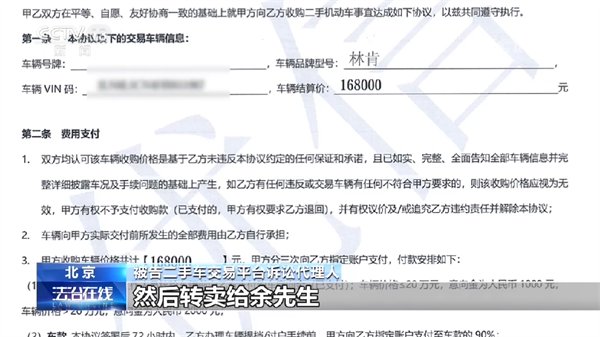
The platform argued that it wasn't aware of the engine replacement when it purchased the car. As a second-hand car sales operator, the platform had fulfilled its obligation to truthfully disclose the vehicle's condition information. Subjectively, there was no intentional fraud and objectively no fraudulent behavior. Therefore Yu's claim for triple compensation had no factual or legal basis, and should be rejected according to the law.
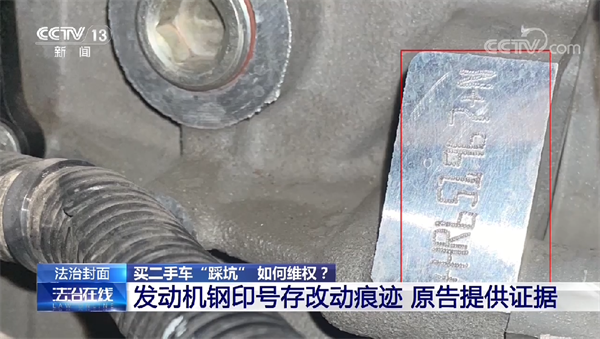
Yu managed to reach the previous owner of the car, who said the engine was replaced at the 4S store, where the car was taken upon being sold.
By law, changing the engine of a vehicle should be registered at the vehicle administration office and the engine number has to be updated. But the involved car's engine number was not altered. By examining the engine's steel seal number, Yu found that there were visible traces of alterations on it and submitted these evidence materials to the court.
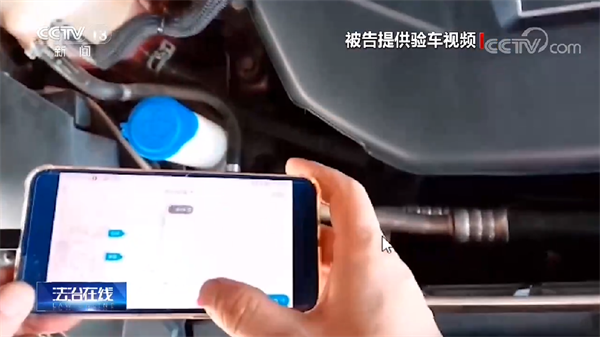
The defendant provided the car inspection video as evidence, which showed that the staff did compare and inspect the parts of the car when it was purchased by the platform. But the process of checking the engine number was missing in the video.
After trial, the BIC concluded that:
The defendant failed to get the maintenance information of the car from the third party. According to common knowledge, it is impossible for a used vehicle to have not undergone maintenance and repairs. The platform should access the maintenance record via other channels and conduct an even more professional and stricter inspection on the car. In this case, the defendant did not further verify the maintenance record of the car, clearly demonstrating a negative and laissez-faire attitude towards the absence of this important information. It is inconceivable that the defendant had no knowledge of the obvious abnormality in the engine number plate when the car was inspected.
Even so, the defendant should have truthfully informed the plaintiff of the absence of the maintenance record, upon which the plaintiff would have taken further action to find out about the maintenance record. During the trial, the maintenance record of the car was discovered, which means the alteration of the engine could have been found out during the transaction.
Regardless, whether the defendant was trying to hide the truth, or it failed to spot the replacement because of its own negligence, it was established that the defendant did not truthfully inform the plaintiff of the involved car's inspection. The silence of the defendant on the negative fact, which could impact the purchase, and the report from the defendant on the car’s condition being normal, violated the real condition, and caused the plaintiff to buy the car based on trust in the defendant. The defendant committed fraud.
Details of the judgment:
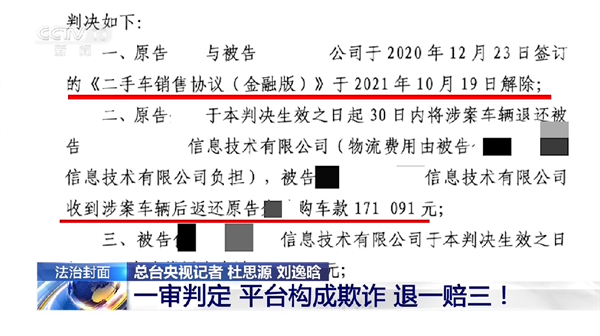
The BIC ruled that the sales contract between Yu and the platform was terminated. When receiving the car, the platform should refund Yu over 170,000 yuan ($25,126) as contracted, which included the car's price and expenses in logistics and the ownership transfer agent fee. And the platform should pay 498,000 yuan as triple compensation. The defendant appealed, and the second instance of the Beijing No 4 Intermediate People's Court upheld the original verdict, which has now taken effect.
Tips from the judge:
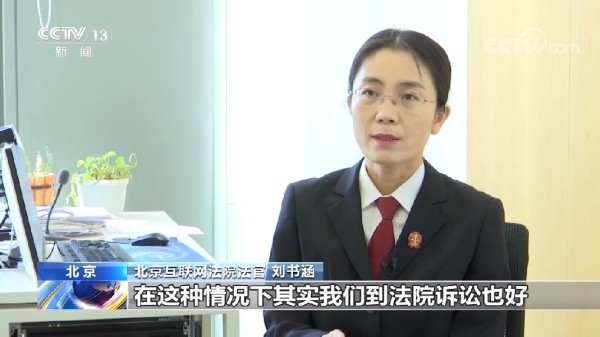
When buying second-hand cars from an online platform, it is hard for consumers to spot problems due to the absence of physical contact. Consumers can claim triple compensation from the sellers, when they believe the seller has committed fraud.
As for those sellers, they are obviously in an advantageous position compared to the consumers as professional car dealers who own the related information. Therefore they should bear more obligations to ensure a fair trading environment.

 Beijing Internet Court Lawsuit Service WeChat Account
Beijing Internet Court Lawsuit Service WeChat Account  Beijing Internet Court WeChat Account
Beijing Internet Court WeChat Account